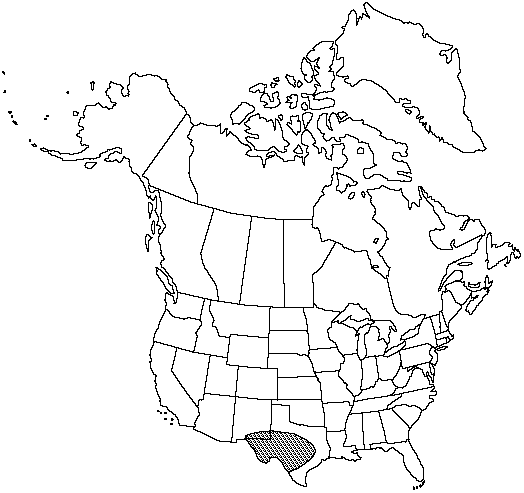Difference between revisions of "Argyrochosma microphylla"
Amer. Fern J. 77: 40. 1987.
FNA>Volume Importer |
FNA>Volume Importer |
||
| Line 14: | Line 14: | ||
|name=Cheilanthes parvifolia | |name=Cheilanthes parvifolia | ||
|authority=(R. M. Tryon) Mickel | |authority=(R. M. Tryon) Mickel | ||
| − | }}{{Treatment/ID/Synonym | + | }} {{Treatment/ID/Synonym |
|name=Notholaena parvifolia | |name=Notholaena parvifolia | ||
|authority=R. M. Tryon | |authority=R. M. Tryon | ||
| Line 32: | Line 32: | ||
|elevation=300–2100 m | |elevation=300–2100 m | ||
|distribution=N.Mex.;Tex.;n Mexico. | |distribution=N.Mex.;Tex.;n Mexico. | ||
| − | |discussion=<p>Argyrochosma microphylla is probably the most distinctive species of Argyrochosma in the flora. Chromosome studies by I. W. Knobloch et al. (1973) suggest that it may include diploid and tetraploid cytotypes.</p> | + | |discussion=<p><i>Argyrochosma microphylla</i> is probably the most distinctive species of <i>Argyrochosma</i> in the flora. Chromosome studies by I. W. Knobloch et al. (1973) suggest that it may include diploid and tetraploid cytotypes.</p> |
|tables= | |tables= | ||
|references= | |references= | ||
| Line 56: | Line 56: | ||
|publication year=1987 | |publication year=1987 | ||
|special status= | |special status= | ||
| − | |source xml=https://jpend@bitbucket.org/aafc-mbb/fna-data-curation.git/src/ | + | |source xml=https://jpend@bitbucket.org/aafc-mbb/fna-data-curation.git/src/8f726806613d60c220dc4493de13607dd3150896/coarse_grained_fna_xml/V2/V2_142.xml |
|genus=Argyrochosma | |genus=Argyrochosma | ||
|species=Argyrochosma microphylla | |species=Argyrochosma microphylla | ||
Revision as of 15:45, 18 September 2019
Stem scales brown. Leaves 7–25 cm. Petiole brown, 0.75–1.5 mm diam. Blade deltate to ovate, 3–4-pinnate proximally, leathery, abaxially and adaxially glabrous; rachis flattened or shallowly grooved adaxially. Pinna costae straight to somewhat flexuous, branches rarely arising from prominent angles. Ultimate segments articulate, dark color of stalks stopping abruptly at segment bases; segment margins recurved to revolute, often concealing sporangia; veins obscure adaxially. Sporangia submarginal, borne on distal 1/3 of secondary veins, containing 64 spores. 2n = 54.
Phenology: Sporulating summer–fall.
Habitat: Rocky limestone hillsides and cliffs
Elevation: 300–2100 m
Distribution

N.Mex., Tex., n Mexico.
Discussion
Argyrochosma microphylla is probably the most distinctive species of Argyrochosma in the flora. Chromosome studies by I. W. Knobloch et al. (1973) suggest that it may include diploid and tetraploid cytotypes.
Selected References
None.